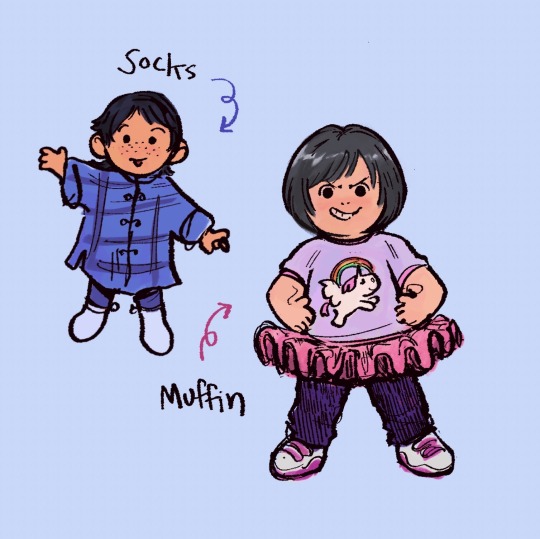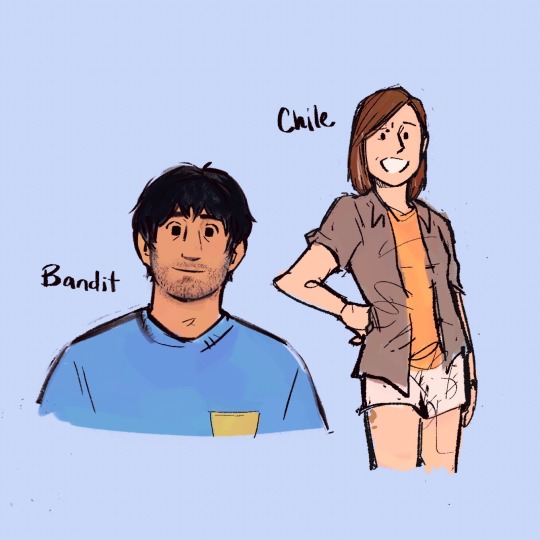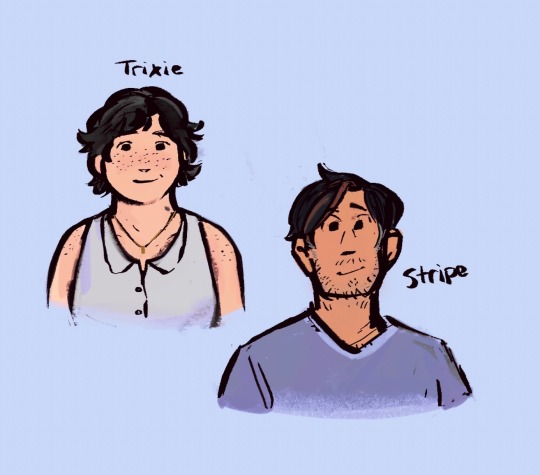#I wish I had the time to do scene redraws with human versions…… so so so much fun to draw
Text




For real life!?
#bluey#fanart#no joke this is my favorite show atm I’m crazy about them#I wish I had the time to do scene redraws with human versions…… so so so much fun to draw
3K notes
·
View notes
Text
Solopreneurs: What’s your fastest Shower, Ship, Succeed story?
Maybe this term already exists. I have no idea. But here’s what I want to talk about: I had an idea for a new class while in the shower yesterday. I announced I was doing it today. It starts in two weeks. In six weeks, I’ll have a pretty clear picture of how successful it was. That seems like a turnaround that solopreneurs are uniquely positioned to create.
Backstory: My COVID vs. Career Crisis
Disclaimer: My family and I have been extremely lucky during COVID. No one has been sick and no one in my immediate family works in healthcare or has a job that requires going in-person work. So, I’m using the term “crisis” with a tremendous amount of privilege. Still, it decimated my industry and how I used to earn a living.
That all being said, when COVID hit, I lost four months of work in one week. It created a huge void in my life. My entire career was built on live: live training and facilitation using IMPROV. I curled up into a ball and started questioning everything I had done in my life. What did it mean? What was at the center of it. About 6 months and 100,000 words (written only to myself) later, and I had the conceptual model for the PLAY Polarities. It was exhilarating. I had an idea of value that I could share with the world. Something of mine that I could sell myself. Only one problem. I didn’t devise the product. Okay, cool. Here’s a model. Everybody has a model. No one pays for an idea. They pay for an application of an idea.
So, simultaneously as I began telling people at PLAYdates (then TDCocoa) about the idea, I began thinking about ways to productize the insights I had assembled. What’s the coaching package? What’s the training program? Etc.
I think about monetization a lot. Between my cozy white male Gen X upbringing and my life in improv, I didn’t get a lot of good ideas about how to make money happen. As a kid I was told by parents and guidance counselors: “just get a general liberal arts degree and you can do anything.” I even once suggested to my stepdad that I might get a degree in public speaking (which turns out would have been hugely valuable as I spent a lot of time as a presentation skills coach). His reaction?
“Why would you get a degree in how to say something instead of getting a degree in what to say.”
Somehow he thought that was a bad idea but didn’t bat an eye as I selected my major in philosophy. PHILOSOPHY.
From there I went into improv where the general approach to everything is, “let’s just help each other out and everything will be fine.” That’s why the only financially successful improvisers are the ones you recognize on TV or the ones with good day jobs. “It’s a mug’s game.”
Don’t get me wrong: improvisation can help you immeasurably as an entrepreneur. I just didn’t know it and never applied it that way. So, consider it a “mod.” Improv doesn’t necessarily help “out of the box.”
So, I did what I always do and why I’ve devoted myself to facilitating transformational self-improvement -- I started reading books about it. How does one become an “entrepreneur?” How does one “monetize” their intellectual property into a service? How does one “productize” their services into clearly defined products?
That brings me to a nice hot shower.
SHOWER: Surprising Yourself with the Big Idea
I’ve been racking my brain about lightweight products to monetize the PLAY Polarities. I turns out that it’s not enough to say, “I do coaching, training, and consulting.” People don’t just start throwing money at you. You have to clearly identify problems and try solving them.
So you discovered a model that seems to organize individual, team, and organizational improvement priorities. Big deal! Who needs that? Do they know they need that? What are they going to do with that knowledge? How can it make or save them money? I.e. WHY SHOULD THEY PAY YOU?
I’ve been beating my head against the wall about this for weeks. And, without exception, each monetization strategy I come up with occurs to me in the shower. It just pops into my head.
“Eureka! I should do this!”
Disclaimer: My spouse and I are watching the TV show, Eureka, right now. That may be a factor.
So the idea for this new class hit me. I would lead a live, virtual class, reduce the rate in exchange for participants letting me record it and turn it into assets for an asynchronous eLearning.
Okay, but if I’m going to do that, before everyone gets too busy returning to the “real world,” I should do it QUICKLY.
“Like April?” says my Shower Daemon.
“Yes! April!” I reply. And then immediately face anxiety. How do I do that?
SHIP: Lessons from Volunteer Carpentry and Seth Godin
Something else I had to learn on my journey to unexpected entrepreneurship? Execution. Yes, my new company is as an assassin.... ON THE DANCE FLOOR! (Jumps up and down, shakes hips, trips, falls, farts.)
I had to learn what Charan and Bossidy talk about in their book, unsurprisingly called Execution. So you have great ideas? Great. What will you do about them? You plan to sell? How will you sell? How many dials? How many LinkedIn messages? When?
Execution is the lifeblood of business. It’s almost too simple to recognize it’s profundity. Yes, duh, to do something, you must, you know, do something. When I tell you that that simple truism has sabotaged most of my professional life, believe me.
As the Apostle Paul says, “The good that I would do, I do not. The evil that I would not do, I do.”
Or, in the Revised Matt Elwell version, “The work that I wish I would do, I procrastinate about. The desk that doesn’t need to be reorganized for the 80th time, I reorganize again. This is, in fact, the perfect day for it.”
As I said in a PLAYdate this afternoon:
Most people get to the starting line and GO! I get to the starting line and keep trying to redraw the perfect starting line. Job one for me is cultivating the habit of running imperfectly.
So, against every instinct, I announced my class on today’s PLAYdate using a slide I created while the participants were in their breakouts.
There are two places. The first was Habitat For Humanity. I was no carpenter, but my home church had a long history with HFH and I loved the few mission days I spent with them. I learned a lot about handling wood and framing out a house. I learned how to “talk to the nail,” making small adjustments to how you struck the nail to encourage it not bend as you encountered resistance. As someone who was pretty much written off in gym class as an irredeemable fat nerd, this was something physical that I felt competent about.
However, because I felt competent, I started wanting everything I did to be perfect. To garner the compliments and validation that meant so much to me as I started. But no. that positive reinforcement started waning, and people instead started looking at me with their heads cocked to one side. I was taking too long.
That’s when I learned a saying I’ve tried to remind myself of my whole life:
“You ain’t building a piano!”
(This was said to me in deep southern New Jersey, so it was more like, “Yuh-aint-buildin’-uh-pian-urr!” And then someone threw a piece of scrapple at me. True story.)
That simple sentence reminds me that I have made a habit, perhaps a compulsion, of fretting over details most people won’t notice. I’ve often excused this by telling myself that I’m an artist and therefore, I’m not just filling orders.
If you’re prone to excusing your own poor time management in favor of artistry, consider this. Are you making a statement about your art with what you are doing, or making a statement about your fear with what you’re not yet doing? Are you really saying something with the detail you’re burning hours on to get “just right” or are you allowing yourself to avoid something that really does present the greater artistic challenge.
As Stephen Covey observed, “avoid being ‘right in the thick’ of thin things.”
That’s my Habitat for Humanity story. My other influence, which is a much shorter story, is Seth Godin. You can still get his ShipIt Journal for free on his blog. And if you have something worth doing, I would suggest using his guide to help you do it. In Godin’s characteristic manner, he helped me realize how much of my failure to execute was motivated by fear.
If you’re terrified of failing at something, your brain will make sure you don’t, by making sure you never really try. Basically, you brain exists to keep you alive. We’ve evolved to not do things that can endanger our aliveness by experiencing and avoiding pain. So, if you’re afraid of failing, you are experiencing a kind of pain. Brains hate that noise. QED: you never quite get around to it.
So when I’m not channeling the kindly old South Jersey carpenter who said, “you ain’t building a piano,” I channel Seth Godin who calmly informs me through his immaculate demeanor and trademark spectacles, “just get it shipped.”
Telling people about my class today was me “throwing my cap over the wall” to make sure I did what I said. I’m already scared thinking about it. But now it’s a fear of not getting it shipped, not of not getting it perfect. That’s the fear I want.
SUCCEED: Coming Soon?
In improv we have a “rule of threes.” It’s integral to comedy:
Offer something
Add something else which, by its very following of 1, begins to create a possible connection/story
Add a third thing which, by association with the other two things, clarifies the connection and resolves it or launches us on a trajectory
Depending on that third offering, you either have a joke or a scene, but either way, you have a good chance a comedy.
Either way, the third thing is where we start seeing “the product.” The thing thing is the embodiment of “oh, I get it....” For example:
If Player A nods to Player B and says, “Cat” and Player B nods back and says “Dog.” Then a lot can happen.
Player A can say, in a business like manner. “Are any other animals joining us at this business meeting?” Immediately, a lot becomes clear. These people are playing animals. They’re doing some kind of animal business. Hilarious.
Player A can say, “Oh, I love dogs! Isn’t the vet here, great?” The two make small talk while their pets are getting treatment. Eventually, they fall in love. (Player A and Player B. Not the pets. Or Do ThEy!?)
Or, Player C can enter and offer a warm, “Hey, Dog!” to Player B and sit down next to them. Then, they can turn and nod in the direction of Player A with a curt, even cold, “Cat.”. Player B can respond happily, so grateful to be acknowledged. Player A can respond to the frosty greeting in a way that makes Player C visibly shiver: “Helloooooo, Mouse.”
No matter which of those scenes interests you, they would all interest someone. In an audience of 150, at least a few would walk out the door of the theater that night and say, “that one was my favorite. That group was so good. Let’s come back here soon!”
Three beats makes a product. Three beats is something people will buy, buy again, and tell their friends to buy. Three beats is success.
As I embark on this journey of Shower-Ship-Succeed, I think about what I need to get to my third beat. And what occurs to me is a clear picture of what success looks like and a practical understanding of what I need to do in myself, in my actions, in my systems, and in my relationships to make that success happen.
Some people might argue (and they might be right) that you shouldn’t get to ship without having a clear picture of success. And maybe they’re right. But don’t let that stop you from starting the creation or “shipping” process. In fact, I’m finding that all three of these states are iterative. You don’t so much go linearly from one to the other.
You have your “shower moment.” Hopefully, you listen to it and start to work on it. You start getting ready to “ship.” I call that whole process “shipping,” not just the putting-it-on-the-shelf-with-a-price-tag part. As you do that, I believe you get a vision for what this will be and who will like it and then you can start asking why they would pay for it, and that can start you on this cycle.
That might be a question that sends you back to the shower for more.
What about YOUR Shower, Ship, Succeed story?
I started this post with a question and then all this stuff just flowed out. (Hooray, my gift of making first drafts five times longer than they have to be!)
Here’s what I want to know: Have you ever, as a solopreneur, or just a creator of anything, noticed a rapid procession from initial idea (Shower) to making something (Ship) to having a desired result (Succeed)?
What was your fastest time?
What helped you get it done so fast?
What slowed it down?
What did you have to overcome -- in the project and in yourself -- to get it done?
Now that I’ve said all I could possibly say, I’d love to hear your stories!
0 notes